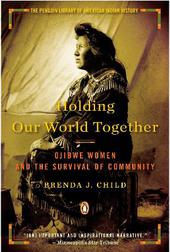
|
Holding Our World Together: Ojibwe Women and the Survival of Community
Paperback / softback
Main Details
| Title |
Holding Our World Together: Ojibwe Women and the Survival of Community
|
| Authors and Contributors |
By (author) Brenda J. Child
|
|
Introduction by Colin Calloway
|
| Physical Properties |
| Format:Paperback / softback | | Pages:240 | | Dimensions(mm): Height 181,Width 127 |
|
| ISBN/Barcode |
9780143121596
|
| Classifications | Dewey:977.00497333 |
|---|
| Audience | |
|---|
|
Publishing Details |
| Publisher |
Penguin Putnam Inc
|
| Imprint |
Penguin USA
|
| Publication Date |
29 January 2013 |
| Publication Country |
United States
|
Description
A groundbreaking exploration of the remarkable women in Native American communities In this well-researched and deeply felt account, Brenda J. Child, a professor and a member of the Red Lake Ojibwe tribe, gives Native American women their due, detailing the many ways in which they have shaped Native American life. She illuminates the lives of women such as Madeleine Cadotte, who became a powerful mediator between her people and European fur traders, and Gertrude Buckanaga, whose postwar community activism in Minneapolis helped bring many Indian families out of poverty. Moving from the early days of trade with Europeans through the reservation era and beyond, Child offers a powerful tribute to the courageous women who sustained Native American communities through the darkest challenges of the past three centuries.
Author Biography
Brenda J. Child is an associate professor of American studies at the University of Minnesota and the author of Boarding School Seasons- American Indian Families- 1900-1940. She lives in Saint Paul, Minnesota.
Reviews"Brenda Child's moving portrayal of the often unrecognized but pivotal roles Ojibwe women played in community survival is, in its determination to record truth, itself an act of leadership--of intellectual sovereignty." - Kimberly Blaeser, author of Apprenticed to Justice "An important, pathbreaking book, not merely a powerful corrective to books that focus on Indian males, but also a powerful corrective to the scholarship on Indian women largely written by non-Indian women." - Jacqueline Peterson, Washington State University-Vancouver "Not only does [Child] describe how and why Ojibwe women were essential to the survival of their culture and community, through her scholarship she demonstrates how this work is being accomplished today." - John Borrows, University of Minnesota
|